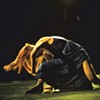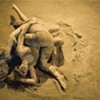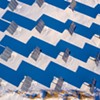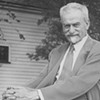click to enlarge 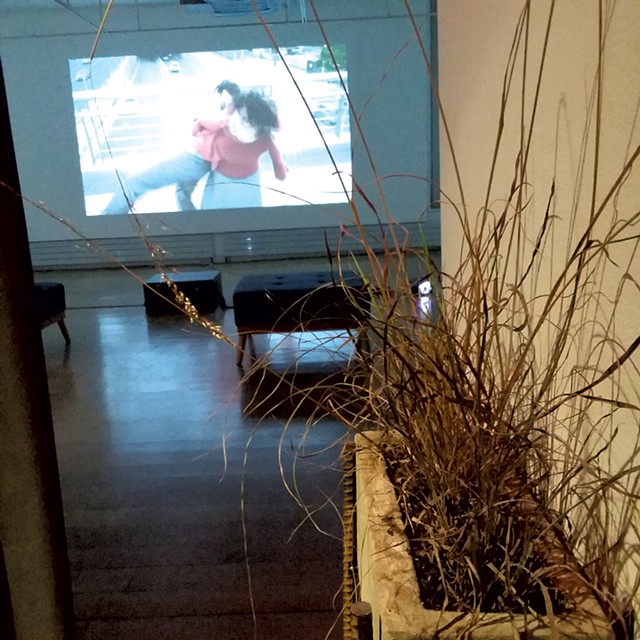
- Elizabeth M. Seyler
- "Becoming Human" by Pauline Jennings
What does it mean to encounter the wild? Some Vermonters discover bobcat tracks in the woods or brave frigid conditions while winter camping. Others view the wild as an external force to be tamed or an inner spark fueling survival.
"For us, 'wild' became defined by having a heightened sense of risk and sensory awareness and then this resulting calm because you decide to cope with it or to enter it," says artist Pauline Jennings. The Jericho dancer, choreographer and filmmaker codirects intermedia performance company Double Vision with her husband, video and sound artist Sean Clute. She teaches dance at Saint Michael's College, and her works have been performed nationally and internationally at sites including the San Francisco Museum of Modern Art and Takt Kunstprojektraum in Berlin.
During 11 months in Shanghai as well as time spent in Vermont, Jennings and her colleagues have explored wildness in relationship to the environment, to other people and to self through film, dance and sound. The resulting multimedia project, "Becoming Human," critiques humanity's relationship with nature in the Anthropocene.
Popularized in 2000 by atmospheric chemist and Nobel laureate Paul Crutzen, the term Anthropocene is used by some scientists and environmentalists to describe the current era of human impact on the planet's geology and ecosystems, including mass extinction, pollution and climate change.
Through three components, Jennings' "Becoming Human" investigates what we are becoming in the midst of such change and our evolving relationship to nature. Her film "The Air Connects Us" is on exhibition at Burlington's BCA Center through February 9. This Thursday, November 29, in Burlington City Hall Auditorium, Jennings gives an artist talk and performs "Sea Inside Our Skin" with Burlington movement artist and actor Joshua Lacourse; Clute provides a live soundtrack. And, on January 26, Jennings and Lacourse will offer a movement workshop in Burlington.
The first thing one sees when approaching the screening room at the BCA Center is a planter made of rusty rebar and concrete that contains a growing patch of long, scruffy grass. Created for the exhibition by Vermont artist Milo Hecht, the planter foreshadows the videos within by inviting the viewer to touch it and interact with it, says Jennings: "It harks back to initial conversations with my collaborator Calvin Aham about what is natural and wild anymore in this world."
Inside the darkened room, the nine-minute, three-channel film "The Air Connects Us" is projected on three walls simultaneously. On the left, Burlington's Aham "is navigating a tree in Shanghai," says Jennings. "He's not climbing it in any typical way you would imagine." Indeed, Aham, who recently earned a bachelor's degree in economics and environmental studies from Saint Michael's College, seems to be on a deliberate, reverent sensory treasure hunt.
On the right, we see Jennings "navigating a stream and rocks and a lot of bird droppings." Whether hanging from a shoreline branch, balancing on her back or bringing her face within inches of the water, she moves slowly and deliberately in a meditative state. It's a dance that evokes curiosity and wistfulness.
During filming, says Jennings, two old men sat on the shore 10 feet from her, fishing polluted waters that ran clean not too long ago. Over the past 30 years, land that once housed farming and fishing communities in the Shanghai district of Pudong, east of the Huang Pu River, has been bulldozed to create a new urban center. "While I was there, a drone confirmed that the very last bit of wilderness in Pudong was gone, was bulldozed," says Jennings. She and Clute chose to spend nearly a year in the Chinese city while he was on sabbatical.
click to enlarge 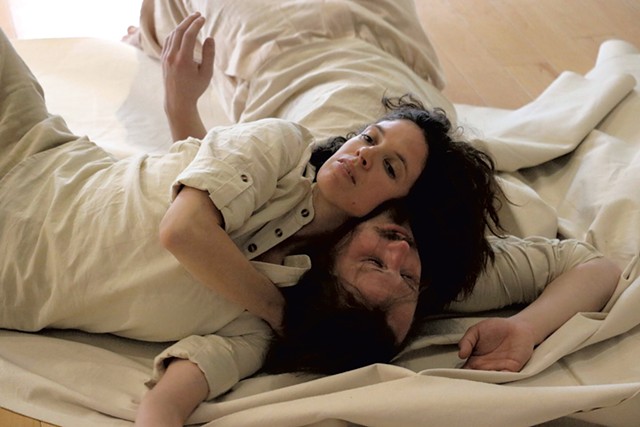
- Courtesy Of Madison Macmahon
- Pauline Jennings (left) and Joshua Lacourse in "Sea Inside Our Skin"
The film shown on the center wall "is really like a plunge into Shanghai," Jennings notes. It's a compilation of 21 sites featuring Jennings and Aham, in solos or duets; they appear on a bridge over a highway filled with speeding traffic, on a sidewalk alongside a concrete building, in a subway car, in a mall and under an arbor. Their bright-red shirts pop like the plumage of tropical birds, proclaiming their foreignness and evoking the power and fragility of human blood. They provide contrast with the gray urban structures and the Shanghai residents dressed primarily in cosmopolitan black.
Clute's soundscore is composed of recordings from the 21 locations: yells from a nearby roller coaster, the horns of shipping barges, Chinese music and conversation. What really throws off the film's viewers, says Jennings, is that "the urban forests are actually the loudest scenes," yet the subway and mall are nearly silent. Experiencing the three-channel film is like making a vicarious venture into a foreign country solely through sight and hearing.
While the film focuses on the external world, the live performance "Sea Inside Our Skin" traverses internal terrain. Jennings won the 2018 SEED Award from Guilford-based Vermont Performance Lab to create the piece, which "looks at our connection to ourselves, to what is wild within us, as well as how we form connections, nourishing connections with other people," explains the artist.
Long strips of canvas on which Jennings and Lacourse move represent the "incredibly messy" process of "trying to connect while retaining our autonomy," Jennings says. "We have to trust. We have to take risks and deepen our understanding and trust of self in order to reach out to the other person. That's the wild."
On Thursday, Jennings offers a talk about the film and describes concepts behind the performance, which is suitable for all ages. At the January workshop, participants will be able to learn more about her creative process.
There's no right or wrong way to experience the performance, Jennings notes. She hopes viewers will "relax into it and take out of it what they will. If it evokes a sense of hunger or thirst for connection, great."










































